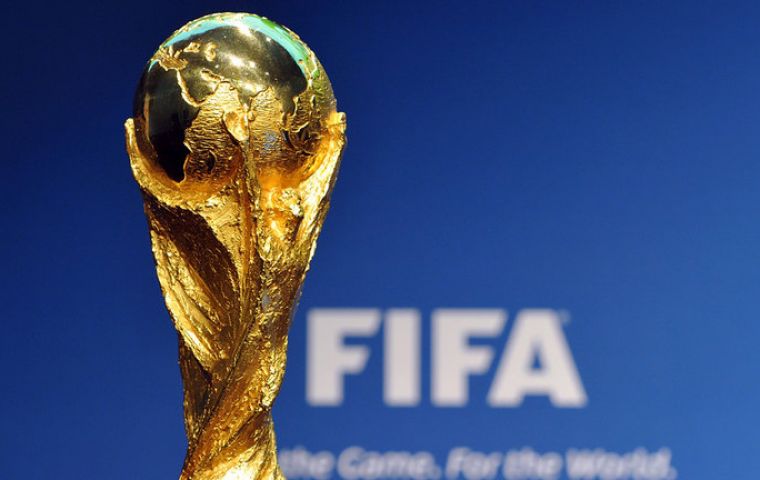MercoPress. South Atlantic News Agency
FIFA agrees 2026 World Cup will have 48 teams; Europe clubs' association objects
 The World Cup expansion will see the number of tournament matches increase from 64 to 80 games, which will be completed in a 32-day schedule.
The World Cup expansion will see the number of tournament matches increase from 64 to 80 games, which will be completed in a 32-day schedule.  The European Club Association ECA said the decision “has been taken based on political reasons rather than sporting ones and under considerable political pressure”, which is “regrettable”.
The European Club Association ECA said the decision “has been taken based on political reasons rather than sporting ones and under considerable political pressure”, which is “regrettable”.  Gianni Infantino’s election to FIFA presidency was built around his manifesto pledge to expand the World Cup.
Gianni Infantino’s election to FIFA presidency was built around his manifesto pledge to expand the World Cup. FIFA's ruling body has voted unanimously to expand the World Cup from 32 to 48 teams in 2026. The FIFA Council approved the plan at its meeting Tuesday in Zurich. Under the new format, there will be 16 groups of three teams. A knockout stage for 32 teams will follow.
The World Cup expansion will see the number of tournament matches increase from 64 to 80 games, which will be completed in a 32-day schedule. FIFA research suggests World Cup revenue could rise nearly 20% to US$6.5 billion, based on figures for the Russia 2018 World Cup.
While football associations have welcomed the move, the European Club Association (ECA), which represents the top professional clubs on the continent, has restated its opposition to the plan and Spain's La Liga has also registered its objections.
“We fail to see the merits to changing the current format of 32 that has proven to be the perfect formula from all perspectives,” said an ECA statement. “Questionable is also the urgency in reaching such an important decision, with nine years to go until it becomes applicable, without the proper involvement of stakeholders who will be impacted by this change.”
The ECA said the decision “has been taken based on political reasons rather than sporting ones and under considerable political pressure”, which it said was “regrettable”.
Gianni Infantino’s election to the FIFA presidency last year, replacing the disgraced Sepp Blatter, was built around his manifesto pledge to expand the World Cup. He has repeatedly said the aim of the 48-team competition is to offer more chance for the minnows of international football to qualify for and experience the World Cup. Critics say growing the tournament will dilute the prestige of the competition and lead to uncompetitive games. There are also concerns around the limited number of countries equipped to host a 48-team competition.
In a release, FIFA attempted to alleviate concerns. “The new 48-team competition format has been drawn up in such a way that there is no reduction in the overall number of rest days and a guaranteed maximum of seven matches for the teams reaching the final, while the current 32-day tournament duration is kept, so as not to increase the length of time for which clubs have to release their players,” the federation said.
“The decision was taken following a thorough analysis, based on a report that included four different format options.
”The study took into account such factors as sporting balance, competition quality, impact on football development, infrastructure, projections on financial position and the consequences for event delivery. Over the course of its next meetings, the FIFA Council is set to discuss further details regarding the competition, including the slot allocation per confederation.”
The 16 qualification slots will not be decided in Zurich, more likely at the FIFA Congress in May. Confederation of African Football and Asian Football Confederation are expected to benefit the most in the divvying up of the extra World Cup berths.
The USA is hot favorite to secure 2026 hosting rights. It may partner with Mexico or Canada. A decision on the host is not due until 2020.




Top Comments
Disclaimer & comment rulesCommenting for this story is now closed.
If you have a Facebook account, become a fan and comment on our Facebook Page!